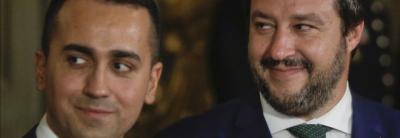Salvini 'closing ports to foreign navy ships'

ROME – Italian Interior Minister Matteo Salvini claimed Monday he plans to close ports to international military ships rescuing migrants, but the Italian defence ministry told him that cooperation with foreign navies is not the League leader's business.
Tension between the two ministers has been building for some time, yet it only today that the clear discrepancy between the Interior Minister, Salvini, and the Defence, Elisabetta Trenta, has become obvious. It is still not clear if the problems will be solved in time for the international deadlines later this week.
What has been said so far? Late on Monday morning, after the arrival of a military Irish ship holding 106 rescued at sea, the Interior Minister posted on twitter: “After having stopped the aid ships, on Thursday I will bring to the European table at Innsbruch the request from Italy to block the arrival of international military boats in the Italian ports that are currently present in the Mediterranean. Unfortunately, Italian governments in the last five years have agreed to let all these ships unload immigrants in Italy. However, with our government the music has changed and will change in the future.”
Altering the Eunavdformed mission, of which the patrol boat Samuel Becket forms a part, will start with closing the ports, and in reality is not so simple a prospect. The mission is European and Italy is a key driver. Operation Mare nostrum, a mission started by the Italian government in 2013, has been created with the objective of concentrating mainly on hunting traffickers and at the moment works on managing the Libyan presence in the sea, a topic very close to Salvini’s heart. Stopping the arrival of military boats in Italy could quickly drive the loss of control of the entire mission and even to its collapse. What’s more, the authority on international missions is in the hands of the International Minister and Minister of Defence.
“Eunavformed is a European mission at an international level, not internal. What should be changed are the rules of the employment of the mission. And these decisions should definitely not be made at Innsbruck,” the Defence insisted. The action, and even the statements coming from the minister, “should be coordinated at a governmental level, otherwise Italy will be nothing other than a few more titles in the paper, making sure that the Italian leader is not someone for us to be proud of.”
Today, the Defence is aiming to continue the use of the boats, today patrolling the Mediterranean, “inside the missions Enunavoformed, Sophia, and Frontext, but making sure that they stay close to the European coast. In this way, it would almost exclusively be the Maghreb countries and in particular Libya involved in the events at sea. This has a risk, however, that the number of those lost at sea will increase even more, to the extent that the situation at Tripoli becomes very unstable.”
To this, Salvini seeks to add another scheme, in which European military boats bring the refugees rescued at sea to Libya. On this point, however, the European authorities have said and repeated that they are against the practice of turning migrants back at sea.
In a bid to alter this power balance, the Interior Minister will present himself before the European committee on Wednesday and Thursday in a bid to debate all the European policies in the field of immigration. The topic of strategy in Innsbruck will be confronted on Monday afternoon.
On the relationships with North African countries, the Defense and Interior ministers could argue again. At the moment, minister Trenta is the only one to have supported the general Kalifa Haftar, while the rest of the government have chosen Fayez Serraj, the president of the Libyan council based in Tripoli, the only person formally recognised by international organisations.
On the topic of welcoming migrants into Italy, Salvini has also revealed his planned spending cuts. “As we enter this month we’re working to cut the cost of the so-called asylum seekers to at least ten euros per person to save half a billion euros every year, that I would like instead to invest in security.” The Interior Minister then explained “our offices are working to cut the costs of immigration. At the moment every asylum request costs us thirty-five euros. Today I have given this indication and I think that by the end of the month we will be able to see the results.”
What these results will be remains to be seen, but will most definitely do nothing to improve the already desperate situation for refugees in Italy.
cb


